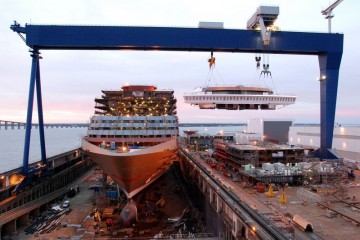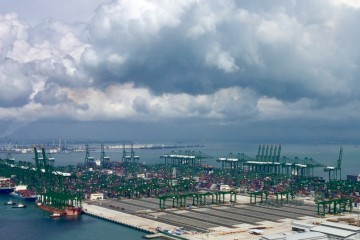Eight months ago I wrote a piece on what the maritime transport agenda of Donald Trump could look like. It raised some interest in Argentina, but not in the US: shipping was not exactly heavily discussed during the election campaign. With the inauguration of Trump one day away, it is time for an update.
At the time, I proposed four measures. Two of these, on port finance and alliances, still seem feasible. The other two much less so, but they raise some important issues to be discussed.
Port finance
American ports need money to adapt to larger ships imposed on them by European and Asian shipping companies. Would it not make sense to make these companies pay for it rather than the US taxpayer?
Trump’s team has released a plan (a few bullet points) to invest one trillion dollar in infrastructure, mostly by private investors. How could this work in the port sector? One of the mechanisms is the Harbor Maintenance Tax to be paid when entering a US port. The HMT is imperfect because the tax is related to the goods’ value and not to the maintenance costs that ships incur. Moreover, there is no link between the HMT that is collected in a port what comes back to the port. The money goes into the Harbor Maintenance Trust Fund (HMTF) and out of the fund most ports get apportioned much less than what they have collected. A fairly straightforward way to increase private funding of port infrastructure and maintenance would be to reform the HMT and HMTF and make sure that it relates to the costs that ports (and port-cities) need to make: so bigger ships and dirty ships should pay more.
Alliances
The container shipping industry has merged incessantly over the last years and cooperated intensively via alliances. This is arguably not in the interest of US cargo owners (because it limits their choice) or US ports (as it increases the risk of shipping companies shifting a large part of their cargo to other ports). Consolidation is subject to regulatory approval by the Federal Maritime Commission (FMC), but the FMC has so far approved all mergers and alliances. The Trump administration could facilitate US exporters by giving them a wider set of shipping companies to chose from. So, come up with stricter rules on alliances to be applied by the FMC. Note that all large container shipping companies are European or Asian, so this might be a relatively easy political sell for an American president stressing national self-interest.
Climate change
I suggested that pricing carbon emissions of shipping could help to limit global outsourcing, and thus bring back jobs. This might hold theoretical appeal, but is not very likely to be implemented by a Trump administration. Its limited interest in multi-lateral organisations and climate change does not bode well for progress at the IMO on reduction of shipping’s carbon emissions: it is unlikely that there will be a substantial package of measures in the 2018 shipping carbon strategy without active involvement of the US and the flag states dependent on them. So we might be heading towards a system of regional measures, rather than a global solution. And we might see China become the global leader in decarbonisation of maritime transport.
Jones Act
The likely new Secretary of Transport made it clear in her hearing: the Jones Act will not be touched. That is not entirely surprising: it is one these holy cows that also a radically abnormal presidency would find difficult to address. Yet it raises a question that has much wider significance: how can a sector – or a country for that matter – be competitive in global markets if it puts up walls to protect its markets? The world will be watching as a new administration searches for the formula to square that circle.



